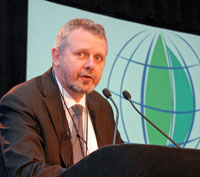Biofuels from the perspective of India and East Africa, as well as Europe and the United States, were part of the discussion at the World Ag Congress in St. Louis on Tuesday.
 Henk Joos with London-based D1 Oils moderated the panel focusing on an integrated approach to biofuels. He stressed that the purpose of the panel was to find solutions. “We can decide to go again in an immense debate on food versus fuel,” he said. “I would like to take a different approach. I would like with my fellow panelists to identify responsible ways to make food and fuel at the same time.”
Henk Joos with London-based D1 Oils moderated the panel focusing on an integrated approach to biofuels. He stressed that the purpose of the panel was to find solutions. “We can decide to go again in an immense debate on food versus fuel,” he said. “I would like to take a different approach. I would like with my fellow panelists to identify responsible ways to make food and fuel at the same time.”
Joos noted, as did several others on the panel, that biofuels alone were not the cause of last year’s dramatic increase in food prices. “Food production per capita in the world has never been higher than it is today,” he said. “It’s not necessarily about the total production of food, it’s really food distribution, getting it to the people who need it.” Not only that, he added, a great deal of food continues to be wasted around the world.
He also pointed out the food and fuel example of Brazil, which has developed a very successful sugarcane ethanol industry using only 0.3% of total acreage to produce sugarcane. “That is a perfect example of how this production can go hand in hand,” he said.
The panelists included former Secretary of Agriculture for India Radha Singh, Lee Broughton with Enterprise, Bill Horan with 25x’25, and professor Nuhu Hatibu, CEO of Kilimo Trust, East Africa. All agreed that there are ways the world can produce fuel from various feedstocks – including non-food like jatropha and algae for biodiesel – and still feed a growing population.
You can listen to the opening remarks of the panelists here: [audio:http://www.zimmcomm.biz/world-ag-forum/waf-09-biofuels.MP3]

